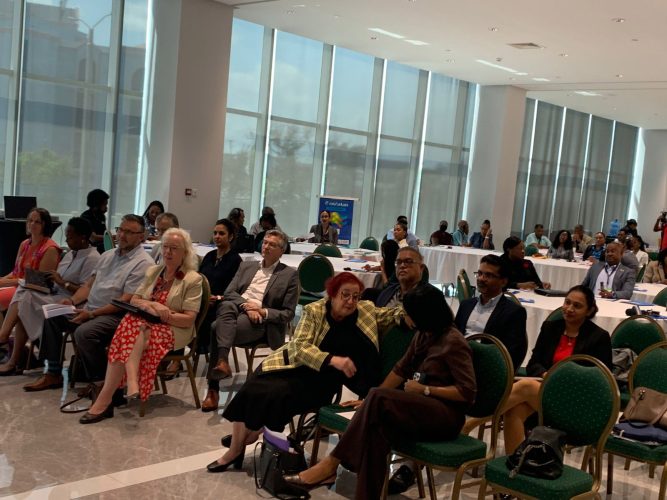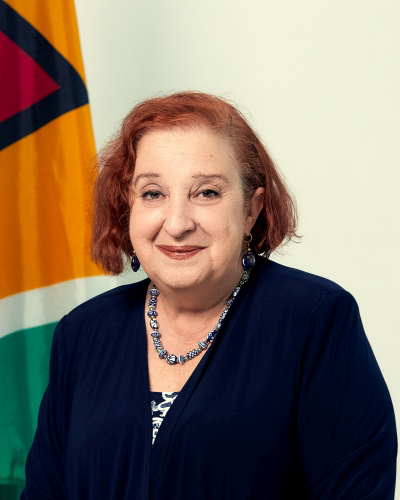Minister of Parliamentary Affairs and Governance, Gail Teixeira yesterday said proposed amendments to the Integrity Commis-sion Act will reduce the room for excuses by declarants.
She was speaking on the sidelines of a workshop that her ministry held with the Private Sector Com-mission on “fighting corruption in Guyana”. It was held at the Pegasus Suites and Corporate Centre.
The workshop, according to the ministry, is a part of the continued efforts by the government since 2021 to strengthen Guyana’s anti-corruption framework. The one-day workshop saw in attendance government officials and senior representatives from several private sector agencies to address the implementation of recommendations emanating from reviews conducted under the Inter-American Convention Against Corruption (IACAC) in March of this year and the United Nations Convention Against Corruption (UNCAC).

On the sidelines of the event, Teixeira, highlighted planned amendments to the Integrity Commission Act. The amendments aim to address “areas of weakness in terms of conflict of interest” and ensure a more precise definition of these issues within the act. Teixeira stated, “We will be amending the Integrity Commission Act in collaboration with the Attorney General… to make it easier for the declarants, [to give] less excuses.” One key change is aligning the reporting timeline with the fiscal year, so public officials will file declarations alongside their annual tax returns in April. This adjustment seeks to simplify compliance and reduce barriers for officials, she said.
When asked about stiffer penalties for non-compliance, Teixeira said that certain offences might still require judicial pro-cesses. She explained that “if you are found guilty of certain offences then you are charged and taken to court… not all of the offences [are immediately prosecuted],” with minor infractions such as late declarations addressed through alternative measures.
Teixeira also mentioned what she described as the ‘’shame and blame game” approach taken by the Integrity Commission wherein publicizing the names of officials who fail to declare on time may encourage compliance. While this has proven effective in some cases, Teixeira acknowledged varying outcomes. The ministry is also exploring electronic filing options, which she hopes to present to Parliament by the end of the year. This digital filing system, Teixeira noted, will ensure declarations are securely submitted and stored, mitigating risks of hacking or data breaches.
She addressed the challenges of verifying official declarations, noting the Commission’s role in investigating discrepancies and ensuring officials accurately disclose their assets.
“If persons are found [making] questionable declarations, they have to go to the police to investigate and the DPP (Director of Public Prosecutions) to recommend charges,” she said. Enhanced digital storage of declarations is expected to streamline these processes, making investigations “less tedious and faster” when officials fail to comply.
Teixeira recognized Guyana’s legislative framework for anti-corruption efforts, citing oversight mechanisms like the Public Accounts Committee and the Auditor General’s Office. However, she noted limitations, particularly in capacity and infrastructure, which affect the efficiency of anti-corruption measures.
Technology
MESICIC (The Follow-Up Mechanism for the Implementation of the Inter-American Convention against Corruption) has suggested several strategies for Guyana to strengthen governance and anti-corruption, many of which involve technology.
Efforts have been made to expand internet access through ICT Hubs in remote areas, allowing indigenous communities to access resources and report corruption. The hubs, free Wi-Fi in public spaces, and surveillance cameras are part of the broader anti-corruption and transparency strategy.
According to MESICIC, creating accessible ICT infrastructure can empower “citizen observers” to play a role in identifying and reporting misconduct. Additionally, there has been encouragement to develop training programmes on internal controls and preventive measures for public servants and to promote best practices within private companies to prevent corruption.
Teixeira recognized existing weaknesses in the enforcement of anti-corruption laws, particularly in investigation and judiciary sectors.
“We have to work more there, and [address] the judiciary… things take too long,” she said. Cases delayed for years weaken the deterrent value of anti-corruption laws, allowing offenders to avoid serious consequences. The minister called for “expeditious and efficient” investigations and trials, noting that lengthy judicial processes undermine public trust and fail to discourage corruption.
Teixeira emphasized the need for investigative procedures rooted in “evidence and facts that can hold up in the court of law.” Improving judicial capacity, she argued, will ensure that corruption cases move forward and that punishments act as effective deterrents.
As part of its anti-corruption commitments, Guyana has implemented the Extractive Industries Transparency Initiative (EITI) and developed ICT resources to support reporting and monitoring. The government’s partnership with the private sector aims to strengthen transparency, uphold ethical standards, and build trust in public institutions.
Teixeira also stressed the importance of moving at a pace that reflects the country’s capacity, while progressively building systems and capacity. “As we move forward in the telecommunications sector… it will make it easier to detect, prevent, and get information out,” she said, affirming the government’s commitment to accountability and anti-corruption initiatives.






